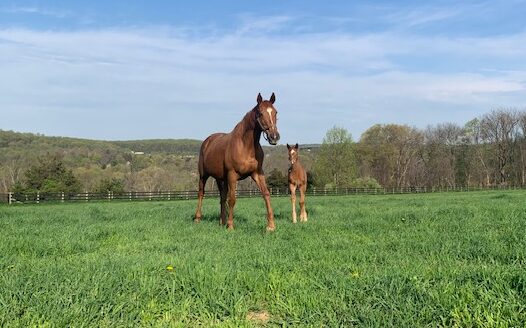Chesco Amish Couple Takes Township to Court Over Horse Rule

Pennsylvania’s constitutional court precedent might be on the verge of a unique expansion if an Amish couple in Chester County is successful at trial.
Samuel and Sadie Mae Stoltzfus of West Caln have brought suit against the township for refusing to allow the couple to keep a horse on a parcel of property across from their home.
Township ordinance says horses must be given at least three acres of land. The parcel across from the Stoltzfus home is one acre. Earlier this year, West Caln officials denied the family’s request to place their horse on the plot. The Stoltzfuses have filed an appeal of the decision in Common Pleas Court.
Assistant Township Manager Kim Milane-Sauro told DVJournal the township could not comment on the matter given that it is pending in court.
Thomas Martin, the lawyer retained by the Stoltzfuses, told DVJournal the couple “are hardworking Amish who only desire to allow their parents to keep their horse on their one-acre tract to abide by their sincere religious beliefs and customs.
“I believe the Board of Supervisors has ignored the law which requires that even restrictions which have general application in the township must be the ‘least restrictive’ necessary to accommodate the public interest sought to be protected when they interfere with sincerely held religious beliefs,” Martin said.
“The Board would not even allow us to question their expert witness on such matters,” he added, “so I believe my clients are being asked to comply with an illegal standard.”
The Amish couple said in their appeal that the township’s refusal to amend its code infringes upon their ability to obey their personal religious mandates, which they said are “sincerely held and compel their compliance for reasons of conscience,” according to the appeal provided to DVJournal by Martin.
Like many Amish, the Stoltzfuses exclusively use horses for transportation. “This is the teaching of the church of which they are members and of their church leaders, and it has been for many years,” they said in their appeal.
“Prohibition of Amish from keeping horses on lots less than three acres in size, when horses are their primary means of transportation, especially as applied to persons living in a rural setting, is an unreasonable and illegal interference with their right of conscience and religious observance,” the appeal states.
The township’s board of supervisors had earlier said that its three-acre minimum rule “is entirely a zoning regulation without any connection to religious affiliation.”
Thomas Jipping, a senior legal fellow at the Heritage Foundation’s Edwin Meese III Center for Legal and Judicial Studies, said the state law presents “a very, very tough standard to meet.”
“There are two steps to a case like that,” he said. “The first is that, in this case, [the Stoltzfuses] would have to say that the government is imposing a substantial burden on his exercise of religion. In this case, they would have to argue that moving the horse across the street, or not being able to do it, substantially burdens their free exercise of religion.
“I think that would be a difficult argument to make,” Jipping said. “The ordinance doesn’t say anything about the Amish not being able to use non-motorized forms of transportation; it has to do with animal safety, and it applies across the board.”
The federal Religious Freedom Restoration Act was first passed in 1993; it holds that the federal government may only “substantially burden” an American citizen’s religious freedom if it is “in furtherance of a compelling governmental interest” and “is the least restrictive means of furthering that compelling governmental interest.”
Twenty-one states have subsequently passed their own versions of RFRA. Pennsylvania’s Religious Freedom Protection Act, passed in 2002, stipulates “neither State nor local government should substantially burden the free exercise of religion without compelling justification” and without pursuing the “least restrictive means” of doing so.
Jipping estimated it would be difficult to argue before a court that the one-acre horse rule presents a “substantial burden” on the Amish religion.
“But if they do get past that obstacle, I think they have a good chance of winning,” he said.
Please follow DVJournal on social media: Twitter@DVJournal or Facebook.com/DelawareValleyJournal


